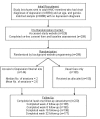Overcoming depression on the Internet (ODIN): a randomized controlled trial of an Internet depression skills intervention program
- PMID: 12554545
- PMCID: PMC1761939
- DOI: 10.2196/jmir.4.3.e14
Overcoming depression on the Internet (ODIN): a randomized controlled trial of an Internet depression skills intervention program
Abstract
Background: Psychoeducational programs are increasingly being delivered over the Internet. We created an Internet-based, cognitive therapy, self-help program to be used as a stand-alone intervention for mild-to-moderate depression, or as an adjunct to traditional services for more severe depression.
Objective: To evaluate the effectiveness of a web-based intervention program to reduce depression in a randomized, controlled trial.
Methods: In a private, nonprofit health maintenance organization, we mailed recruitment brochures to two populations: depressed adults (n = 6994) who received traditional medical services for depression, and an age/gender matched sample of nondepressed adults (n = 6996). Participants consenting to the study were randomized to either the experimental Web site (n = 144), or a no-access control group (n = 155). Participants in both groups were free to obtain nonexperimental, usual care services for their depression. All participants completed an on-line version of the Center for Epidemiological Studies Depression Scale (CES-D) at enrollment and at 4-, 8-, 16- and 32-weeks after enrollment. Mean intake scores were in the severely depressed range. 74% of participants completed at least one follow-up assessment. Unfortunately, most intervention participants accessed the Internet site infrequently.
Results: We failed to find an effect for the Internet program across the entire sample. However, post-hoc, exploratory analyses revealed a modest effect among persons reporting low levels of depression at intake.
Conclusions: The negative results might have resulted from infrequent patient use of the Internet site, or a more seriously depressed sample than the intervention was intended to help. Future studies should focus on recruiting persons with mild to moderate levels of depression, and on increasing participant use of the Internet site.
Conflict of interest statement
None.
Figures
Comment in
-
Issues in evaluating health websites in an Internet-based randomized controlled trial.J Med Internet Res. 2002 Dec;4(3):E17. doi: 10.2196/jmir.4.3.e17. J Med Internet Res. 2002. PMID: 12554548 Free PMC article. Clinical Trial. No abstract available.
References
-
- American Psychiatric Association, authors. Practice guideline for the treatment of patients with major depressive disorder (revision) Am J Psychiatry. 2000 Apr;157(4 Suppl):1–45. - PubMed
-
- Hollon SD, Shelton RC. Treatment guidelines for major depressive disorder. Behav Ther. 2001;(32):235–258.
-
- Regier D A, Narrow W E, Rae D S, Manderscheid R W, Locke B Z, Goodwin F K. The de facto US mental and addictive disorders service system. Epidemiologic catchment area prospective 1-year prevalence rates of disorders and services. Arch Gen Psychiatry. 1993 Feb;50(2):85–94. - PubMed
-
- Hirschfeld R M, Keller M B, Panico S, Arons B S, Barlow D, Davidoff F, Endicott J, Froom J, Goldstein M, Gorman J M, Marek R G, Maurer T A, Meyer R, Phillips K, Ross J, Schwenk T L, Sharfstein S S, Thase M E, Wyatt R J. The National Depressive and Manic-Depressive Association consensus statement on the undertreatment of depression. JAMA. 1997 Jan 22;277(4):333–40. doi: 10.1001/jama.277.4.333. - DOI - PubMed
-
- Marrs R W. A meta-analysis of bibliotherapy studies. Am J Community Psychol. 1995 Dec;23(6):843–70. - PubMed
Publication types
MeSH terms
Substances
LinkOut - more resources
Full Text Sources
Medical




